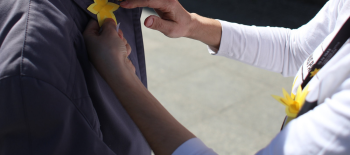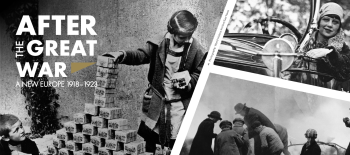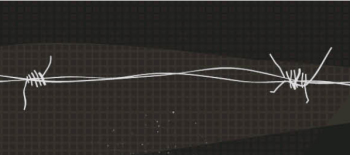The MUNDANEUM Archive Centre in Mons is holding a “Semaine de l’Europe (Europe Week)” – captioned “L’Europe commence ici (Europe Starts Here)” – from 9 until 14 May 2017. This week is the last week of the exhibition “Et si on osait la paix (What if we gave peace a chance?)” and the first of the exhibition on the Constitution of the Third of May put together by the Polish State Archives. A facsmile of the 1791 Polish Constitution will be there to view (on loan from the Council of Europe in Strasbourg) for the whole week. The collaboration between the Mundaneum and the Polish State Archives has been boosted by the procurement of the European Heritage Label (in the framework of Creative Europe, cultural framework project overseen by the European Commission).
The private viewing of the exhibition on the constitution, which retraces the major milestones in the creation of the document as well as its dissemination at European and global level, will take place on Tuesday 9 May at 18:30. This will provide visitors with the opportunity to discover even more about the ties which bind Poland to Belgium and Europe, with the help of presentations by Katia VANDENBORRE (ULB/FNRS) and Philippe GODEFROID (Honorary Consul of Poland in Charleroi).
PRACTICAL INFORMATION
>>> Espace Utopia of the Mundaneum (rue de Nimy 76, 5000 Mons) – see map
>>> Tuesday 9 May 2017 – 18:30 > 21:00
>>> free of charge
PROGRAMME of the “Semaine de l’Europe – l’Europe commence ici”
>>> 9 May 2017
Inauguration of the exhibition on the Polish Constitution
with: Katia VANDENBORRE (ULB/FNRS) and Philippe GODFROID (Honorary Consul of Poland)
>>> 10 > 14 May 2017 (end of the exhibition “Et si on osait la paix”)
Free visits of the exhibitions “La Constitution polonaise du 3 mai 1791” and “Et si on osait la paix”
>>> Thursday 11 May 2017 and Friday 12 May 2017
School guided tours (with commentary by a specialist from Poland)
>>> Satursday 13 May 2017 – 13:00 > 17:00
European Day for a Large Audience
Guided tours of the exhibitions with the Polish expert from the Warsaw Archives
Tasting Sessions
Competition “Mon Europe. Mon symbole pour l’Europe (My Europe. My Symbol for Europe)” (radio and social networks)
You can see the exhibition from 10 until 14 May 2017 and from 21 June until 31 August 2017.
+++ http://expositions.mundaneum.org/fr/expositions/la-constitution-polonaise-du-3-mai-1791
Katia VANDENBORRE
A graduate in Slavic Languages and Literature (ULB), Katia VANDENBORRE (1985) defended a doctoral thesis in 2012 on “Le conte dans la littérature polonaise du XXe siècle (The Fairytale in XXth Century Polish Literature)”, which was co-supervised by Warsaw University. After spending one year at New York University in 2014-2015, she resumed her work as a research fellow for FNRS and currently works in this capacity at the Faculté de Lettres, Traduction et Communication (Faculty of Literature, Translation and Communication) at the ULB. She is interested in the literature, history and culture of central and Eastern Europe. Her most recent work deals with the cultural transfers between Poland and Belgium at the turn of the XIXth and XXth centuries.
EUROPEAN HERITAGE LABEL
Since 2016, the Mundaneum has been the first Belgian site recognised by the ‘European Heritage Label’. It thus joins 28 prestigious cultural institutions, such as Cluny Abbey and Robert Schuman’s house in France, as well as the Peace Palace in the Hague (Netherlands). Our membership (of the EHL) is symbolic of the meeting of diverse ideals linked to the European project for one thing and the humanist spirit of the founders of Mundaneum, Paul Otlet and Henri La Fontaine, for another. Two projects underpinned by the same dream: achieving peace through culture!
Why Mundaneum?
The founders of the Mundaneum, Henri La Fontaine (awarded the Nobel Peace Prize in 1913) and Paul Otlet, took part in the peaceful, intellectual and political debates which were raging across Europe in their day. The content of our collections, just like the network of people and institutions set up by our founders, has contributed towards an exchange and the opening up of new partnerships which promote intercultural dialogue. The Mundaneum is therefore an historic symbol of peace through culture in Europe.Qu’est-ce que le Label du Patrimoine Européen?
What is the European Heritage Label?
The sites of the European Heritage Label mark the milestones in the creation of today’s Europe. Visting one of these sites means experiencing what it was like to build European civilisation. These sites celebrate and symbolise European integration, ideals, values and history. They are carefully selected for their symbolic value, the role which they played in European history and the activities which they offer in order to encourage the European Union and its citizens to talk to each other and build a shared democratic area.
Thanks to the European Heritage Label sites, visitors can get an idea of the actual size and scale of the kind of opportunities and achievements for which Europe hopes. On a site which bears the label, there are always a thousand things to see and do; visitors can find a range of exciting, engrossing and educational activities.
MUNDANEUM
Dubbed ‘Google on paper’ (Le Monde) or ‘The Web that Time Forgot’ (New York Times), the Mundaneum is first and foremost the visonary undertaking of Paul Otlet and Henri La Fontaine. From the end of the XIXth century, they were planning to collect and class methodically all knowledge, whatever form it came in. Now an archive centre and exhibition space, the Mundaneum is responsible for the upkeep of a heritage made up of books, posters, postcards, glass plates, newspapers and millions of sheets from the Universal Bibliographic Repertory, recognised by Unesco. With its contribution to heritage, technology and social debate, the Mundaneum, the benefactor of this universalist vision, rendered sublime by a design by François Schuiten and Benoit Peeters, is an important actor in the former European Capital of Culture (Mons held the title in 2015).
Through temporary exhibitions, the Mundaneum explores the project launched by its founders, Paul Otlet et Henri La Fontaine: knowledge in the service of world peace!
A place that was unique in its kind, Mundaneum houses a heritage site recognised by Unesco. An archive centre and temporary exhibition space, it highlights the legacy and ideas of its founders, Nobel Peace Prize laureate Henri La Fontaine and the father of the documentation of science, Paul Otlet. At the turn of the XXth century, these two Belgians imagined a system to collect, classify and research all the world’s knowledge. And all with a noble goal in mind: that of achieving world peace.
With its current focus on the information society foreseen by its founders, the Mundaneum weaves a web linking heritage and digital innovation, education and technology, inner peace and the world which surrounds us. Temporary exhibitions, guided tours, digital tools, conferences and workshops make the Mundaneum into a crossroad of knowledge, where the past comes face to face with the present!
The origin of the Mundaneum takes us back to the end of the XIXth century. In the heart of Brussels, it was created on the initiative of Paul Otlet (1868-1944), father of the idea of the web, and of Henri La Fontaine (1854-1943), awarded the Nobel Peace Prize in 1913. Back then, the project aimed to bring together and index all of the knowledge in the world. The Mundaneum became a documentation centre with a universal nature and, throughout the first half of the XXth century, was the cradle of international humanist institutions dedicated to knowledge and universal brotherhood.
Today, the Mundaneum’s mission is to catalogue, conserve and price the archives and collections beqeathed by its founders: almost 6km of documents and the 12 million sheets from the Universal Bibliographic Repertory! The Reperory, today known as ‘The Web Time Forgot’ (The New York Times) or ‘Paper Google’ (Le Monde), is listed in the Unesco ‘Memory of the World’ register. The Mundaneum is also the first Belgian site to join the European Heritage Label thanks to its role in building he European identity through a shared ideal: achieveing peace through culture!
Located in Mons, European Capital of Culture 2015, the Mundaneum is henceforth a mulifaceted and modular space which reflects its activities: temporary exhibition area, educational space, Utopia space which hosts conferences and workshops as well as associations, archive centre with reading room and digitisation centre.
At the heart of the process of digital transformation, the Mundaneum describes itself as a centre of digital culture and a fabulous place of experimentation, combining heritage, technological innovation and dialogue around a diverse Europe.
+++ www.mundaneum.org
Links
Mundaneum: http://www.mundaneum.org
Documents
- MUNDANEUM & POLOGNE : 2 patrimoines à l’honneur: 413___flyer_Munda_Semaine_europe396215532848.pdf



